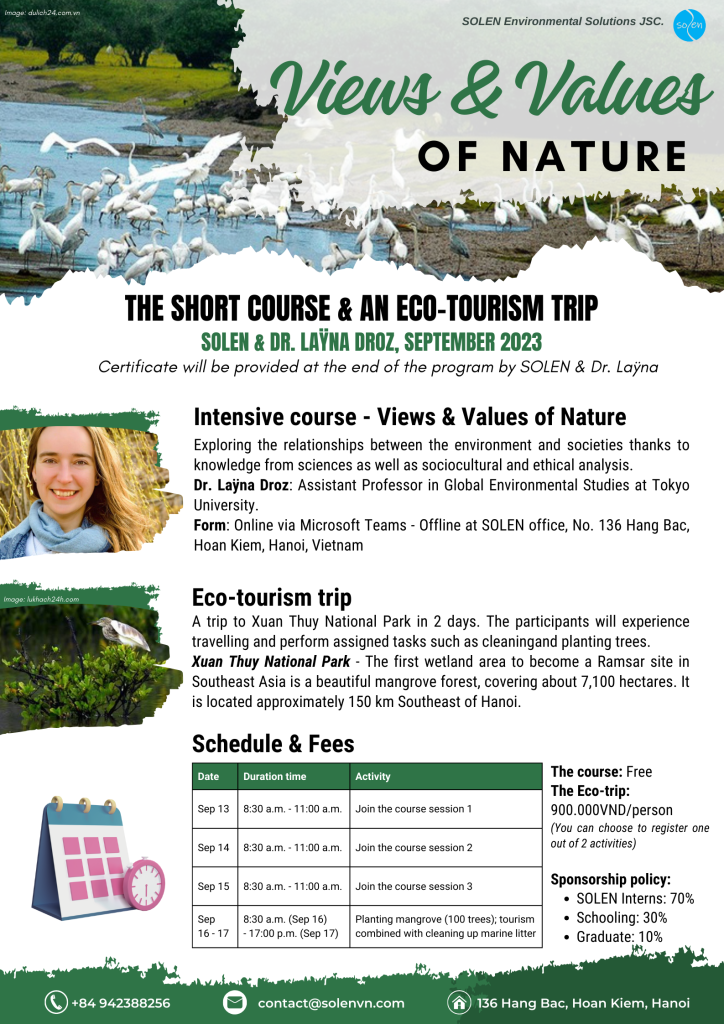
The Short intensive course & an Eco-tour
SOLEN & Dr. Laÿna Droz, September 2023
1. Lecturer
Dr. Laÿna Droz: Assistant Professor in Global Environmental Studies at Tokyo University.
2. Program Description
Program name: The course “Views & Values in Nature”” combined with an eco-tourism trip. The program combines the hybrid course “Views & Values in Nature” and an eco-tourism trip to Xuan Thuy National Park – Nam Dinh, Vietnam
Time: 13 – 17 September 2023
Location:
- The course: Online via Microsoft Teams; offline at SOLEN office, 136 Hang Bac, Hoan Kiem, Hanoi
- The eco-tour: Xuan Thuy National Park, Giao Thien, Giao Thuy, Nam Dinh.
Register Now!
Openning date: August 11, 2023
Closing date: September 10, 2023
(23:59 p.m. Hanoi time)
- Please read carefully all the information bellow about the short intensive course and the eco-tourism trip before you register for the program.
- About the short intensive course, participants are welcome to join any session out of three sessions of the course depending on their time!
We look forward to having a chance to accompany with you in this program!
Views & Values of Nature
(short intensive course)
Subject field, Keywords: Environment, science, policy, ethics
Recommended Qualifications/ Knowledge: The content is structured for students who are interested in the interrelations between environment, society and cultures.
Course overview: Alongside knowledge from natural sciences, sociocultural and ethical analysis is essential to understand the relationships between the environment and society. This course aims at learning the fundamentals of sustainability from an interdisciplinary perspective.
Syllabus Overview of Each Class
- Sciences: Biodiversity loss, climate change and pandemics (IPCC & IPBES)
- Environmental ethics
- Sustainability and transformative change: What to sustain, what to change?
- Values of Nature
- Views of Nature: What does “nature” mean in different cultures and languages?
- Eco-anxiety and ecological emotions
- Ressources: Ecological nationalism and eco-orientalism
- Debriefing
Views & Values of Nature (short intensive course) – Schedule
| 3 sessions (2-3 hours each) | |||||||
| Session 1 | Session 2 | Session 3 | |||||
| 45mn | Ex Cathedra + Q&A Sciences: Biodiversity loss, climate change and pandemics (IPCC & IPBES) O: Learn how to read critically UN reports and how they are made |
Ex Cathedra + Q&A Short summary of session 1 Values of Nature and living through nature O: Mapping the values of Nature |
Ex Cathedra + Q&A Short summary of sessions 1-2 Resources: Ecological nationalism and eco-orientalism O: Identify the assumptions behind some rhetorics |
||||
| Break | |||||||
| 45mn | Ex Cathedra + Q&A Environmental ethics O: Distinguish between descriptive, normative and prescriptive |
Ex Cathedra + Q&A What does “nature” mean in different cultures and languages? O: Identify the limits of sciences and the role of culture (critical thinking) |
Debriefing & discussion
5-10 main messages of the course |
||||
| Break | |||||||
| 45mn | Discussion Sustainability and transformative change: What to sustain, what to change? O: Get an overview of different views |
Workshop Eco-anxiety and ecological emotions “Thinking at the Edge” exercise in pairs (Share positioning before + after exercise) O: Brainstorming & creative thinking |
|||||
Course objective
Through this course, students are expected to:
- Get an overview of different views regarding sustainability and environmental ethics;
- Understand the political and ethical aspects underlying the relationship between societies, cultures, and the environment;
- Critically analyse sources by understanding the working processes of science-policy interfaces on environmental issues such as biodiversity loss and climate change.
Skills:
- To critically assess sources;
- To apply critical thinking to political and ethical aspects regarding the relation between environment, culture and society;
- To be able to engage in interdisciplinary discussions with diverse stakeholders.
Teaching Methods:
The course will be based on PowerPoint, videos and the board. In-class group work will be conducted.
Pre-class Study Load [preparation & review] None.
Method of Evaluation:
Attendance and participation: 60%; Group work: 40%.
Dr. Laÿna Droz
Assistant Professor at Tokyo University, Coordination at Network of Asian Environmental Philosophy
About
– Exploring the role of cultural lenses at the science-policy interfaces on environmental issues
– Taking a pragmatic approach to environmental policy-making and ethics at the global scale
Xuan Thuy National Park
Xuan Thuy is the 50th Ramsar site worldwide (1989) and the first Ramsar site in the Southeast Asia. In 1995, Government decided to establish Xuan Thuy Wetland Natural Reserve in the area, which was upgraded to Xuan Thuy National Park (XTNP) (2003). Besides that, XTNP was acknowledged as the critical core zone of the Red River Delta Biosphere Reserve (2004). All of the national and international titles of Xuan Thuy Ramsar, Xuan Thuy National Park and Biosphere Reserve somehow reflect importance/values of this area in terms of biodiversity conservation, socio-economics, environmental and social education, and ecotourism.
https://www.vuonquocgiaxuanthuy.org.vn/
Image: lukhach24h.com
Image: baotainguyenmoitruong.vn
Image: dulich24.com.vn
Image: lukhach24h.com



 Tiếng Việt
Tiếng Việt 日本語
日本語